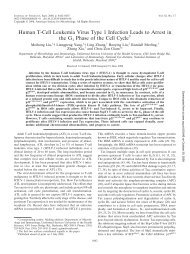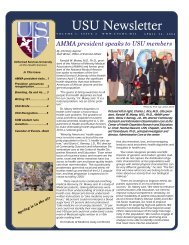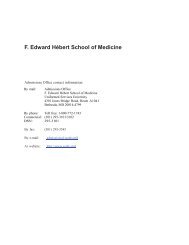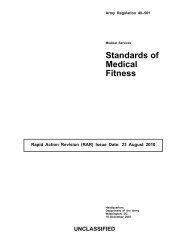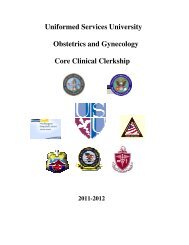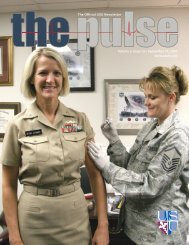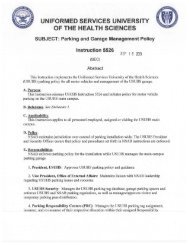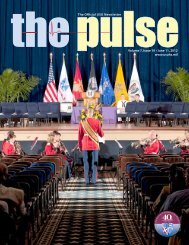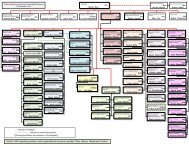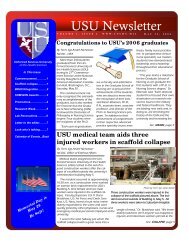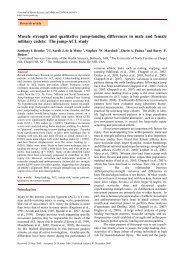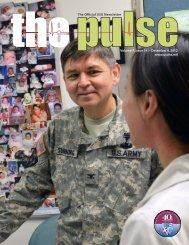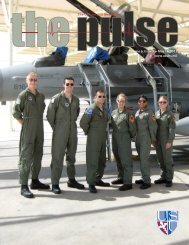Annual Report - Uniformed Services University of the Health Sciences
Annual Report - Uniformed Services University of the Health Sciences
Annual Report - Uniformed Services University of the Health Sciences
Create successful ePaper yourself
Turn your PDF publications into a flip-book with our unique Google optimized e-Paper software.
AFRRIArmed Forces Radiobiology Research InstituteIt is imperative that <strong>the</strong> military and <strong>the</strong> larger medical community, indeed, <strong>the</strong> nation, be prepared for <strong>the</strong> threat<strong>of</strong> nuclear or radiological attack. A component <strong>of</strong> USU, <strong>the</strong> Armed Forces Radiobiology Research Institute(AFRRI) provides unique expertise and capabilities in <strong>the</strong> field <strong>of</strong> radiation biology. Researchers <strong>the</strong>re are workingon novel assessment and treatment technologies to protect both military and civilian populations.EXPOSURE LEVELS AND HEALTH RISKSA nuclear or radiological attack could result inmass casualties and would likely cause a range <strong>of</strong>acute and long-term health consequences. Researchconducted at AFRRI is improving <strong>the</strong> ability to rapidlyassess an individual’s exposure to radiation.Scientists at AFRRI are creating new approaches toclassical biodosimetry, which is based on cytogeneticdamage, for casualty triagesoon after exposure. One area<strong>of</strong> study focuses on developingdose-assessment assays that usetransportable equipment to testeasily obtained samples, such ashair, fingernails, urine or a drop<strong>of</strong> blood. Utilizing innovativeapproaches, <strong>the</strong>y are also improving<strong>the</strong> accuracy, dose range, ease <strong>of</strong>use and speed <strong>of</strong> biodosimetry.To ensure <strong>the</strong> health <strong>of</strong> our service members, AFRRIscientists established a new approach to assessing<strong>the</strong> potential health effects <strong>of</strong> militarily relevantmetals that may become embedded as shrapnel.Researchers evaluate <strong>the</strong> acute and long-term healthrisks <strong>of</strong> metals, such as depleted uranium and tungstenalloys, and explore potential treatments for anyadverse effects.ExpertiseMEASURES TO COMBAT RADIATION EXPOSUREAFRRI scientists provide research resultsand expertise to <strong>the</strong> U.S. Government and<strong>the</strong> DoD in <strong>the</strong> field <strong>of</strong> radiation biologyand help inform and develop policies andnational response plans. For example, incollaborations with <strong>the</strong> international scientificcommunity, AFRRI acts as a catalyst topublish medical and technical informationbased on data from nuclear accidents andincidents in o<strong>the</strong>r countries. Such informationcan be used to direct rescue operations,including those resulting from terrorist actionsor industrial nuclear accidents.28Researchers are also investigating treatmentoptions to protect both service members andcivilians in a variety <strong>of</strong> radiation exposurescenarios. Using <strong>the</strong>ir understanding <strong>of</strong> <strong>the</strong>mechanisms <strong>of</strong> radiation damage, AFRRIscientists are pursuing new and improvedpharmacological approaches to prevent<strong>the</strong> health-degrading and potentiallylife-threatening effects <strong>of</strong> ionizing radiation.Making use <strong>of</strong> novel cellular and molecularapproaches and complex physiologicalsystems, <strong>the</strong> researchers are working tomove <strong>the</strong>se potentially life-saving drugs fromdiscovery through <strong>the</strong> FDA approval process.



